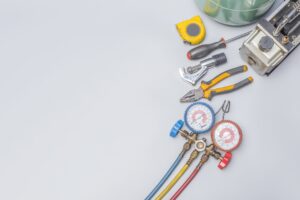 Do you know what’s frustrating? When you’ve got a thousand things on your plate as a business or building owner, and an HVAC technician starts using a bunch of words you’ve never heard. Things like “modular rooftop units,” or “temperature differential,” can sound like they’re speaking a different language. There isn’t a class that’s really available to take for knowledge on the HVAC industry, so you’re just left in the dark.
Do you know what’s frustrating? When you’ve got a thousand things on your plate as a business or building owner, and an HVAC technician starts using a bunch of words you’ve never heard. Things like “modular rooftop units,” or “temperature differential,” can sound like they’re speaking a different language. There isn’t a class that’s really available to take for knowledge on the HVAC industry, so you’re just left in the dark.
Well, not anymore! That’s why our team has a blog post. We want to be able to teach out customers information that might be vital to them in the future. For commercial HVAC in New Haven, IN, that means your business could be more comfortable and energy efficient if you’re aware of how some of this technology works.
So, let’s talk about some vocabulary words and how they relate to the HVAC field.
Three Important Terms
Hello everyone, class is in session! Today, our topic is three great terms to know when investing in commercial HVAC work. These can help you understand your prospective technician more, and give you an upper hand when trying to save money.
“Modular Rooftop Units”
Rooftop air conditioning units are the prime way we cool commercial spaces here in New Haven. These systems sit on the rooftop so they’re out of sight and out of mind, and because your commercial property is larger than a residential property, you’ve likely got plenty of room on the rooftop to hold these units.
When we say they’re modular, what we mean is that they can be added or subtracted based on the amount of air that needs to be cooled. If you add a new section to your commercial property, you can simply add a new modular AC unit to cool it, so you don’t have to overhaul the whole commercial HVAC system.
“Temperature Differential”
Simply put, the temperature differential is a term used to describe the difference between the outdoor temperature and the inside temperature. The larger this differential is, the more energy your systems will use to keep things cool and comfortable. It’s an important metric to be aware of when you’re trying to plan for your next commercial energy bill.
“Efficiency”
We’re not just talking about energy efficiency in this case, but the overall efficiency of your technology. Sure, energy-efficiency relates to how much electricity your commercial HVAC system consumes to do its job. The lower that amount is, the more efficient it is. But efficiency can mean different things too.
If your system has been unmaintained for a long time, for instance, it’s going to run less efficiently. Sure, that could mean that it’s using more electricity, but it could also mean something else. An “inefficient” commercial HVAC system might have components that rub up against each other causing friction. Or it could have parts that need to be replaced or adjusted, since they’re just running in a sub-optimal way. An inefficient air conditioning system is never a good thing, and it can be fixed with maintenance or repairs.
For help with your commercial HVAC system, contact Collier’s Comfort. True Comfort, True Savings.
